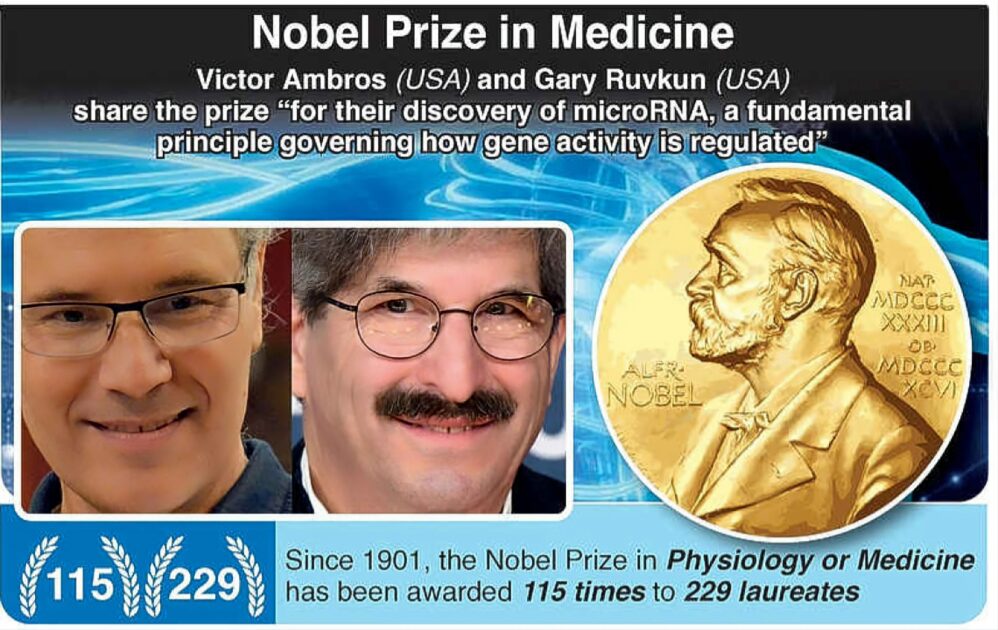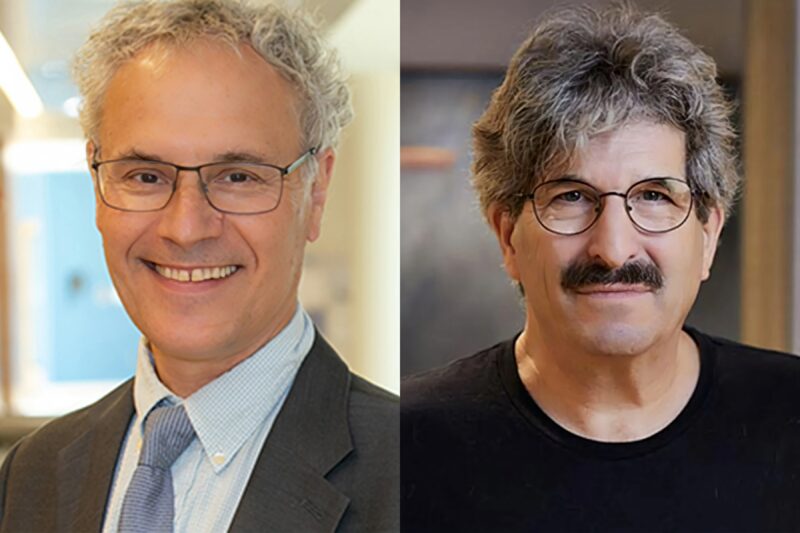American scientists Victor Ambros and Gary Ruvkun have been awarded the prestigious Nobel Prize in Physiology or Medicine for their groundbreaking discovery of microRNA, a small molecule with a profound influence on gene regulation.
Their pioneering research has reshaped our understanding of genetics and continues to have far-reaching implications for medicine, disease treatment, and developmental biology.
The Groundbreaking Discovery
MicroRNAs (miRNAs) are small, non-coding RNA molecules that regulate gene expression by binding to messenger RNA (mRNA), preventing it from being translated into proteins. First identified in 1993, these molecules have emerged as key regulators of various biological processes, including cell development, proliferation, and differentiation.
Ambros and Ruvkun’s work revealed how microRNAs control gene expression, a discovery that has opened new avenues for understanding the mechanisms underlying human diseases, including cancer and neurodegenerative disorders.
Ambros, currently a professor at the University of Massachusetts Medical School, and Ruvkun, a professor of genetics at Harvard Medical School and Massachusetts General Hospital, were recognized for their collaborative research.
Their discoveries have provided a foundation for new therapeutic approaches targeting microRNAs to treat diseases. The Nobel Assembly at the Karolinska Institute lauded their work as “a fundamental principle for understanding how organisms develop and function” and praised the discovery’s profound impact on biological research.

The discovery of microRNA challenged conventional views of genetics. Previously, it was believed that genes were regulated primarily by proteins. However, Ambros and Ruvkun demonstrated that microRNAs could regulate genes without encoding proteins themselves.
These tiny molecules can influence hundreds of different genes, adding a layer of complexity to how genes are controlled and how cells function.
David Bartel, a molecular biologist from the Whitehead Institute, emphasized the importance of microRNA in understanding the biology of disease. “MicroRNAs are crucial for development, physiology, and behavior. Their ability to alter the activity of so many different genes makes them master regulators in the body,” he stated.
Researchers hope that understanding microRNAs will lead to breakthroughs in developing treatments for a wide range of conditions, including cancer, cardiovascular disease, and immune disorders.
Impact on Medical Research
The role of microRNAs in gene regulation has sparked intense interest among researchers aiming to develop novel treatments for complex diseases. According to scientists, targeting microRNAs could revolutionize the field of gene therapy by offering more precise methods for controlling abnormal gene expression.
However, translating this discovery into clinical applications remains a challenge. Delivering RNA molecules to specific cells without causing unintended side effects has proven difficult. Nonetheless, several therapeutic approaches are currently in development, with the hope of one day harnessing microRNAs to treat genetic disorders.
The Nobel Committee highlighted that Ambros and Ruvkun’s discovery could be just the beginning. As research into RNA therapeutics advances, the potential for microRNAs to reshape modern medicine is immense.
The announcement of the Nobel Prize in Physiology or Medicine marks the start of the 2024 Nobel Prize season. The Nobel Prizes in Physics and Chemistry will follow on Tuesday and Wednesday, respectively, while the Literature and Peace Prizes will be revealed later in the week. The Nobel Memorial Prize in Economic Sciences will be announced on October 14.
The laureates will receive their awards at a ceremony on December 10, coinciding with the anniversary of Alfred Nobel’s death. Each Nobel Prize comes with a cash award of 11 million Swedish kronor (approximately $1 million USD).
This year’s Nobel Prize in Medicine follows the recognition of Katalin Karikó and Drew Weissman in 2023 for their work on mRNA vaccines, which played a critical role in combating the COVID-19 pandemic.
The committee continues to emphasize how fundamental research, often starting with curiosity-driven investigations, leads to discoveries with vast global impact.
What’s Next for MicroRNA Research?
Though the discovery of microRNA has already transformed biological science, much remains to be learned. Researchers are still uncovering the full range of functions that microRNAs perform in different types of cells and tissues. Moreover, the development of RNA-based therapies, though promising, is still in its infancy.
Future research aims to overcome the challenges of delivering microRNAs to specific tissues, which could open the door to new treatments for diseases that have been difficult to tackle with traditional therapies. With ongoing advancements in RNA technology, Ambros and Ruvkun’s pioneering discovery is likely to continue shaping the future of medicine.










Join our Channel...